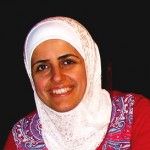Students push for former Arabic professor’s return to Iowa State

Ghina Alameen, lecturer in world languages and cultures, began having work permit issues in September.
October 19, 2015
Some students at Iowa State could say they like some of their professors or even have a friendship with one, but not many can say they are taking measures to help one get their job back.
This is the case for numerous Arabic students at Iowa State. When Ghinwa Alameen, lecturer in world languages and cultures, lost her ability to work in the United States in September because of work permit issues, her students decided to take a stand.
“I am on a work permit, and I filed to renew it back in February,” Alameen said. “It usually takes two to three months, but mine has been taking over eight months.”
Alameen said she was told by U.S. Citizenship and Immigration Services that her permit is still processing.
Her former students have been working toward getting her back in the classroom ever since she was asked by the university to leave. They have been collecting signatures, arranging meetings with university administration and even communicating with immigration leaders and members of the U.S. government.
“The overall impression of her is that she is not just a professor that is there to teach and leave,” said Peter Benzoni, senior in computer engineering and one of Alameen’s former students. “She really cares about the success of her students, the program and the Arabic community as a whole.”
Alameen came to Iowa State in 2005 to pursue graduate work. Before coming here from her home country of Syria, she worked as a teacher.
She served as the only Arabic professor before her immigration issues.
During her time at Iowa State, Alameen started many initiatives, including starting the Arab Students Association last semester. There, she worked with getting more people involved with the association, including members of the Arabic community.
Alameen is also hosting a cultural event Tuesday and Wednesday called “Save Syria” in the Free Speech Zone, where members of the organization will be raising awareness about the crisis in Syria.
“She gave us the opportunity to tutor. She set up a situation for study abroad this summer. She’s just done so much to help me,” said Emily Bannantine, sophomore in political science and one of Alameen’s former students. “You could just really tell she cared, so I want to help her.”
The support for Alameen has come out of the woodwork during the past few weeks, and her former students are spearheading the charge.
“She cares for her students, her students care for her,” said Jake Dehaai, senior in political science. “She’s gotten us a lot of opportunities.”
The Arabic program may be small, but it has taken off in the past few years. It currently consists of two years of study with four courses and study abroad opportunities.
“In the past two years, more students have shown increased interest in learning Arabic, and enrollment numbers have doubled,” Alameen said. “In addition to learning the fourth most spoken language in the world, students are introduced to its rich culture and civilization.”
Although Alameen has grown the program in a short amount of time, she has had immigration issues in the past. In summer 2013, she had trouble receiving her work permit, so the university had to find a replacement for her introductory Arabic class.
Since this round of visa trouble happened in the middle of a semester, Iowa State had to quickly find a replacement who could start as soon as Alameen left.
However, it was a difficult transition for some students.
“To throw somebody in there with no teaching experience and a completely different teaching style throws off learning hugely,” Benzoni said.
Other students agree with Benzoni that a new teacher mid-semester can be a problem.
“It impeeds learning and the ability to process the language,” Dehaai said.
Although Alameen is in a tricky situation with immigration and unable to work for the school she has had ties with for years, she is appreciative of her students’ help.
“I was really humbled by all of [my former students’] efforts to bring me back,” Alameen said. “It assures you that you’re doing something right in the classroom, you’re affecting people’s lives and you get something in return for it. It’s very touching.”
Former students of Alameen agree that other students can relate to her problem.
“It hits a nerve with students because we all have a professor like [her] who has really influenced us,” Benzoni said.
Former students also agree that this recent change drastically impacts the future of many students.
“The possibility of having more students and more educational opportunities for those students and having that taken away, that is a point where students should come together and take a stand against it,” Dehaai said.















